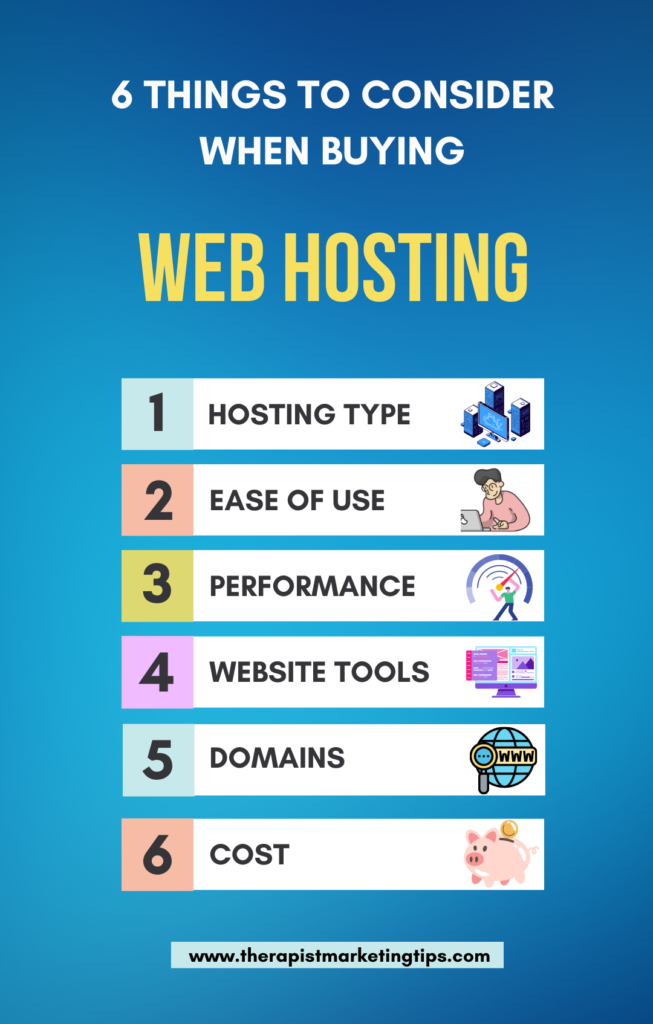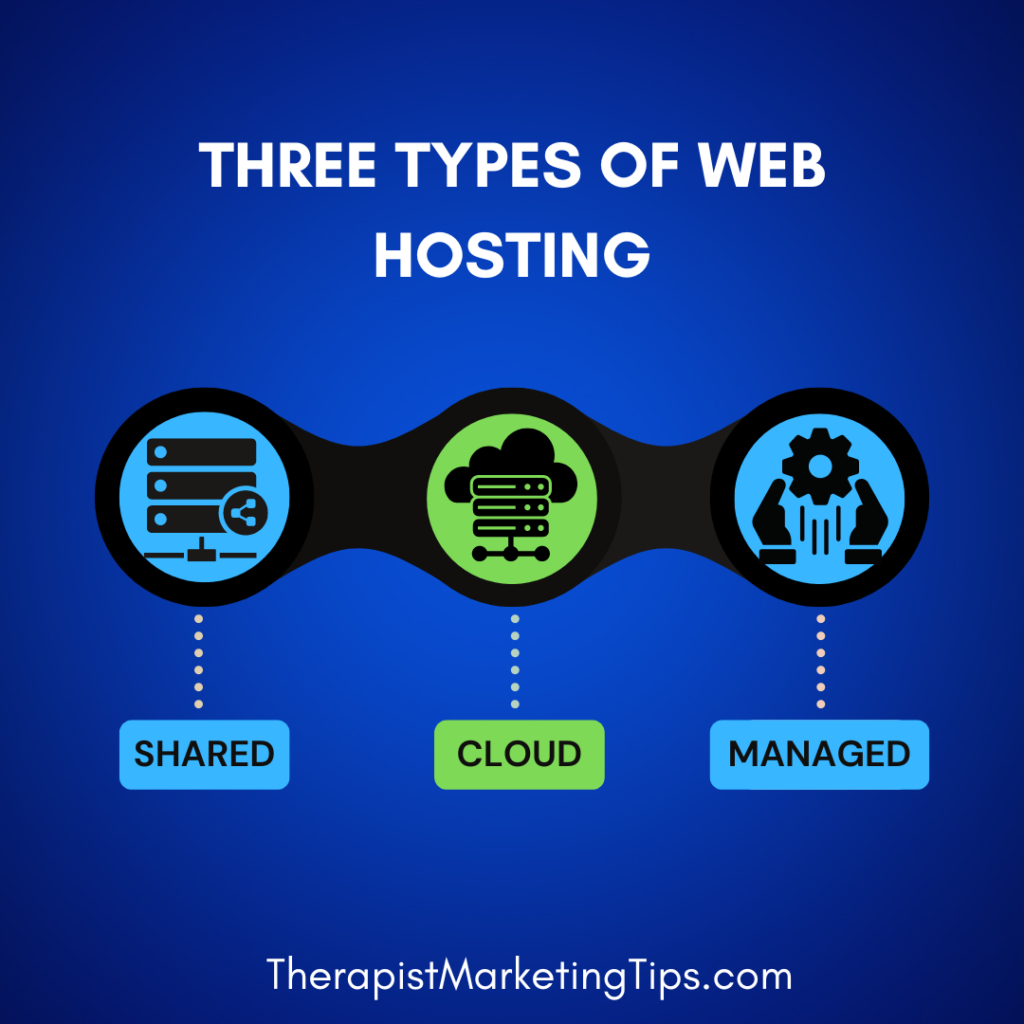In this complete guide to web hosting for therapists, I’ll talk you through everything you need to know about picking the best host for your website.
According to one source, there are no less than 330,000 web hosting companies out there, all competing for your hard-earned money. That’s a heck of a lot of options, and while you may be tempted to simply go with the cheapest available option, I’ve found that this isn’t always such a good idea.
I’ve been building and hosting websites professionally since the early 2000s and writing about websites since 2012, so you could say I’ve learned a thing or two about which hosting provider is worth the money.
In the following guide, I’ll draw on this experience to answer your questions about choosing a web hosting package for your therapy practice.
Web Hosting for Therapists: Everything You Need to Know
First things first, let’s answer the most critical question of all:
What is Web Hosting Anyway?
When we talk about web hosting, we’re talking about a computer server which hosts the files that make up your website.
Every site on the Internet, including this one, your own therapist website, and even Amazon, is just a collection of files that work together to present your site to visitors via their web browser.
Every page is an individual file.
Every image is an individual file.
Behind the scenes, you’ll also have many little files full of complicated-looking code that control how your website looks and functions.
When buying web hosting, you’re basically renting space on a server specifically designed to store those files so they can be accessed on the Internet.
It’s like how you access files on your computer or smartphone.
Those files are stored on your device. When you want a particular file, navigate to it, click on it, and it opens up.
When visitors want to access a page on your website, they navigate to it (using their web browser), and the page (basically just a file) opens up.
The only difference is that some of the files on your hosting server (the pages, images etc.) are accessible to everyone, whereas the files on your computer are only accessible to you and whoever you give access to.
Who Needs Web Hosting?
If you’re building your therapist’s website using WordPress or a similar tool, you’ll need to buy web hosting.
This will give you space on a hosting company’s servers to install WordPress and store all your pages, posts, images, and other files.
If you’re hiring a professional web designer, they might offer to host the site for you for a fee, or they may expect you to sort out your own hosting so they can upload your site. If you’ve decided that bringing in the pros is the best option for building your website, it’s worth asking them about hosting before they start.
Who Doesn’t Need Web Hosting?
You don’t need to buy web hosting if you’re using an online website builder tool like Wix, Weebly, or Squarespace. The monthly payment you make to those services includes a charge for hosting your website, so you’ve already got it covered.
Where Do You Get Web Hosting From?
You can buy web hosting from any one of thousands of hosting companies.
Throughout this guide, you might also see me use the terms ‘hosting provider,’ ‘hosting service,’ or something similar.
All of these terms refer to the same thing:
A company that has lots of enormous physical computer servers (both in actual size and the amount of data they can store!) and rents out space on those servers to website owners.
Later, I’ll share with you my recommendations for the best web hosting companies for therapists, but first, let me tell you about the essential things you’ll need to look for when deciding which one of my top five choices to use.
What to Look for When Choosing Web Hosting for Your Therapy Practice

The following key factors are the ones I use when determining which hosting company I will use for a project. When picking a hosting plan of your own, I recommend keeping these factors in mind.
1. Hosting Type
There are many different types of web hosting. Still, I won’t bother going into detail about things such as Virtual Private Servers, partly because it’s really bloody boring but mostly because it’s unnecessary for a therapist running a small business to bother with such advanced hosting options.
Instead, I want to tell you about three main types of hosting. I’ll also tell you which one I think is best.

1. Shared Hosting
Shared hosting is the cheapest and most common type of web hosting you’ll find. You’ll be able to get a decent shared hosting package for a couple of quid per month, and if you’re trying to keep your budget as low as possible, this might be a smart move.
The problem with shared hosting is that it could be better in terms of performance and reliability (more of which in a moment).
This is due to the way this type of hosting works.
Hosting companies take one of their massive servers, divide it into sections, and rent out those sections to customers.
This is why they’re so cheap.
A hosting company can rent the same server to hundreds of customers, thus meaning they can offer rock-bottom pricing.
However, because you’re sharing the same server resources with other websites, if one of those other websites uses up a lot of resources, that could take away from the resources you need to ensure your site performs at its best.
What’s more, if one of those websites gets hacked, that could give cybercriminals access to the entire server and all of its websites, including yours.
Of course, the best web hosting for therapist options will promise that they take steps to protect your resources and keep your site safe, but there’s only so much they can do to keep that promise.
2. Cloud Hosting
Cloud hosting puts your website on a vast network of servers called The Cloud and allocates resources like performance and bandwidth, which are exclusive to your website.
Not only that, but because there’s a whole group of servers powering your website, you don’t have to worry about your site going offline just because one physical server is down. If one server has a problem, the others simply pick up the slack.
It’s sometimes a little pricier than shared hosting, though I’ve seen cloud hosting prices tumble in the last few years, and it is possible to get some pretty good deals if you shop around.
Ultimately, this proves to be a better option. It means your site performs better, is more secure, and won’t be affected by other sites.
3. Managed WordPress Hosting
There’ll be some smart alec out there who will probably pull me up on the fact that managed WordPress hosting isn’t really a type of hosting as it can be provided in both shared and cloud hosting forms.
That said, I’m going to class it as its own unique thing because of the benefits it offers.
With regular shared or cloud hosting, you’re responsible for everything.
You install WordPress, build your site, and take responsibility for things like security, updating your website’s software when new versions become available, performance optimisation, and more.
With managed WordPress hosting, all that stuff is literally managed for you.
Whether you go with cloud or shared, you’ll find that the server (or group of servers) is optimised for the WordPress platform to ensure it runs fast and doesn’t go offline.
You can install WordPress by clicking a single button that launches an easy-to-follow setup wizard.
From there, a managed hosting company will take care of the backups for you and even handle things like updating the core WordPress software (and sometimes your themes and plugins, too) whenever an update is required.
This is a lot less hassle than doing it yourself, especially if you’re still a novice website owner.
The biggest problem with managed WordPress hosting is that it’s more expensive than standard shared hosting or cloud hosting, but it’s the best deal as it saves you a lot of time and plenty of headaches.
If you want my advice (and you’ve read this far, so I assume you do), go for a managed WordPress cloud hosting option to get the best of all worlds.
2. Ease of Use
Throughout my years of experience, I’ve found that some web hosting companies are just a pain in the arse to deal with.
They don’t explain things very clearly, the dashboard and navigation menus aren’t very well-designed, so it’s a chore to find the feature you need, and the customer support makes you jump through hoops to fix what are often quite simple problems.
Obviously, this is no good if you’re building your first website and still aren’t 100% confident in what you’re doing.
This is why I only ever recommend hosting companies that are beginner-friendly.
Services like the ones I’ll show you later do a great job of making it as easy as possible for anyone to build and launch a website, even without technical experience.
It’s easy to find what you need, the tools and features are a doddle to use, and the support is super helpful if you do get stuck.
3. Performance and Reliability
Remember earlier when I discussed the different hosting options and kept banging on about performance and reliability?
That’s because these two things are the two most essential elements of good web hosting, at least from a technical website.
Performance
Performance refers to the speed at which your website loads in visitors’ browsers. The longer it takes to load a page, the greater the risk of leaving. Obviously, if you’re using your website to attract new clients, that’s the last thing you need.
Page load speeds (literally – the speed it takes a page to load) are even one of the factors that Google considers when it decides where to rank your website in search results.
The slower it takes to load, the further down the rankings you’re placed. This means visitors are less likely to click on your site and become clients.
The faster it loads, the higher up those rankings you climb and, thus, the more clients you attract.
Reliability
Reliability is pretty much what it sounds like – how reliable is your web hosting server?
Web hosting is pretty complex, and any number of factors could cause your hosting server to temporarily go offline, taking your website with it.
The amount of time that your website is offline is known as downtime.
The amount of time your website is online and performing properly is known as uptime.
Sadly, no web hosting company can promise 100% uptime, though you will find that many of the best web hosts offer what’s called an ‘uptime guarantee’ of at least 99.9%.
It goes without saying that you want to pick a web host that offers the best uptime rates.
In my guide to the top four best web hosts that you’ll find at the end of this guide, at least two (Hostinger and 1&1 Ionos) have never given me a single problem with downtime, and my websites consistently perform well with them.
5. Website Options
Next, check if the web hosting company you’re considering signing up with supports the platform that you want to build your website with.

If you’re creating your site on WordPress, it’s good news.
Since WordPress powers almost half of all websites on the Internet, there’s not a decent web hosting company that doesn’t support it.
In fact, as I mentioned earlier, many of the best ones make it stupidly easy to launch a WordPress website just by clicking on a button.
Some even provide drag-and-drop site-building tools similar to Wix to make your site the easiest way possible while still enjoying the benefits of high-performance hosting.
Other popular website-building tools include:
- Joomla
- Magento
- Drupal.
There are many others too, but I wouldn’t worry about them because they are not the best platforms for creating a therapist website.
6. Domains and Emails
If you read my guide to domain names for therapists, you may recall that a domain name is simply a way for users to access the files on your hosting server.
For the sake of simplicity, we’ll call this your web address.
TherapistMarketingTips.com is the domain name for the website you’re reading now.
Amazon.com is the domain name for the famous online store.
YourTherapyPractice.com -or something similar- will be the domain name for your therapy practice website.
You can buy a domain name separately from a company called a domain registrar.
In some cases, this is the cheapest option. However, it also means you’ll have to carry out a process called “configuring nameservers.” Although this process is pretty easy, it can be intimidating if you don’t have much experience with websites.
The easier way is to look for a web hosting company that also sells domain names.
When you buy your web hosting and domain name together, they’ll automatically be synced. This means you can start building your website immediately without having to do anything technical.
Some web hosts will even offer you a free domain name for your first year, though your domain may cost you more in the long run once you have to start paying for it.
7. Cost
There’s one thing I really need you to know about web hosting:
Things aren’t always what they seem.
Since customers have so many options to choose from, hosting companies are in fierce competition with one another and will typically compete on price by offering low-cost introductory deals.
At first glance, this seems incredible, especially when you find companies offering web hosting for as little as £1 – £3 per month.
Look a little closer, and you’ll often find that these low rates are only available if you sign up for a contract lasting one, two, or more years. After that contract ends, you’ll likely pay double or even triple the original amount for your hosting.
On the face of it, this isn’t such a terrible thing.
Those cheap shared web hosting deals make it possible to get your website online with minimal investment. When the time comes to renew your hosting contract, you should be making enough money from your therapy practice to cover the higher price tag.
Still, I mention this because I do want you to pay attention to pricing and consider both the short-term and long-term costs when picking a web host.
Top 4 Best Web Hosting for Therapists

I’ve tried dozens of different hosting companies over the years. Some are great, some are terrible, and most fall roughly in the middle.
Below, I’ll share my recommendations for the top five best web hosting options for therapists based on my own experience.
Please note that all prices are accurate as of January 13th, 2023.
1. Hostinger – Best for Performance

Hostinger is the company that currently hosts Therapist Marketing Tips. Like many users, I was first drawn in by their low-cost plans and a glut of positive reviews. Still, I have since found that the company also delivers in terms of performance, reliability, and security.
My sites load incredibly fast on Hostinger, and I’ve never had any problems regarding the actual hosting.
Where the company falters, however, is in its customer service and all-round ease of use.
As I say, I’ve been hosting websites for many years, and I can say with certainty that there are more user-friendly hosting companies. If you run into problems configuring your sites, you may also find that the customer support team is excruciatingly slow to respond.
That aside, once you get the hang of things, you’re unlikely to get such high-quality hosting for such low prices anywhere else.
Pricing: From £1.49 per month (renews at £9.99 per month)
2. 1&1 Ionos – Best for Beginner

Before I switched to Hostinger, 1&1 Ionos were my absolute favourite web hosting company. I used them to host my first therapy practice website and continue to host a few upcoming projects there.
What I love about 1&1 is that their platform is an absolute breeze to use. I know many therapists who lack confidence in navigating their way around “technical” stuff like launching a website.
If you’re one of them, this might be the company for you.
Their highly intuitive platform makes it easy to launch a brand-new website in a matter of minutes.
What’s more, their customer support is among the best I’ve seen from any hosting company. The response times are fast, the support staff friendly and helpful, and I’ve yet to run into a problem that wasn’t resolved in a few minutes.
Performance-wise, I really can’t fault 1&1. My sites have always performed well on their hosting servers, though I can’t deny that they load much faster on Hostinger.
Oh, and I did mention they’re incredibly affordable, too.
Pricing: From £1 per month (renews at £8.99 per month)
3. GoDaddy – Best for eCommerce Features

If you’ve only ever heard of one hosting company, GoDaddy is probably it.
One of the oldest web companies around, GoDaddy are practically a household name today thanks to some massively successful marketing campaigns.
Whether the hype is justified depends on what you prioritise the most.
GoDaddy was the first web hosting company I ever tried, and I’ve always found them to be very easy to use, making them a great alternative to 1&1 Ionos for beginners.
They also have excellent deals on domain names. However, their long-term pricing is higher than average, and while GoDaddy-hosted websites generally perform well, I have experienced downtime issues.
Given these last two points, the company isn’t usually the first one I recommend to therapists looking for web hosting. On the rare occasion that I do recommend them, it’s to therapists who want to take payments directly from their website, as GoDaddy has some excellent eCommerce tools that are as user-friendly as you could hope for.
Pricing: From £3.99 per month (renews at £7.99 per month)
4. GreenGeeks – Best Green Hosting

If you’re committed to sustainability and minimising the impact on the environment caused by running your therapy practice, GreenGeeks may appeal.
As its name implies, the US-based company offer eco-friendly hosting, calculating its annual energy consumption and investing three times that amount in Renewable Energy Certificates (REC).
GreenGeeks are neither the fastest nor most affordable hosting company on their market. Still, their plans are generally solid, secure, and reliable, while newcomers should have no issues getting to grips with the platform.
Pricing: From $2.95 USD per month (renews at $10.95 USD per month).
What is the Best Web Hosting for Therapists? My Final Recommendations
Ultimately, picking the best web hosting for your therapy practice depends on what’s most important to you.
If you’re launching your practice on a shoestring budget and looking to save as much as possible, Hostinger’s cheap hosting plans are certainly worth a look.
If you’re a novice at all this “technical stuff” and want a hosting plan that’s as easy as possible to set up with world-class customer support and reasonable pricing, opt for 1&1 Ionos.
To incorporate online store features into your website so clients can book and pay for sessions directly, use GoDaddy’s impressive suite of eCommerce tools, or boost your eco-friendly credentials, look at GreenGeeks.
Enjoyed this post? Get more marketing advice for therapists every week by following Therapist Marketing Tips on Facebook.




Comments are closed.